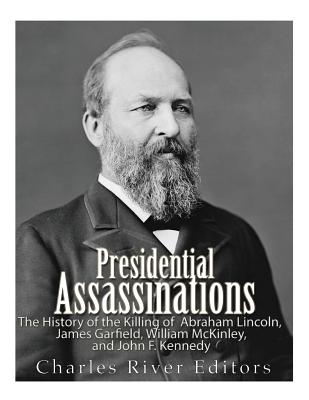Presidential Assassinations: The History of the Killing of Abraham Lincoln, James Garfield, William McKinley, and John F. Kennedy

*Includes pictures *Includes online resources and a bibliography for further reading Until April 14, 1865, John Wilkes Booth was one of the most famous actors of his time, and President Abraham Lincoln had even watched him perform. But his most significant performance at a theater did not take place on the stage. That night, Booth became one of history's most infamous assassins when he assassinated President Lincoln at Ford's Theatre in Washington, D.C. Booth was a member of the prominent 19th century Booth theatrical family from Maryland and, by the 1860s, was a well-known actor. But he was also a Confederate sympathizer who dabbled in espionage, and he was increasingly outraged at the Lincoln Administration. Although Robert E. Lee's Army of Northern Virginia had surrendered days earlier, Booth believed the war was not yet over because Confederate General Joseph E. Johnston's army was still fighting the Union Army, so he and his group of conspirators plotted to kill Lincoln and other top officials in a bid to decapitate the federal government and help the South. In 1880, Civil War veteran James Garfield was running as a Republican for president, and one of his supporters was a man named Charles Guiteau, who wrote and circulated a speech called "Garfield vs. Hancock" that aimed to rally support for the Republican candidate. Though few knew it, Guiteau's family had already deemed him insane and attempted to keep him committed in an asylum, only to have him manage an escape from confinement. Garfield went on to narrowly edge Winfield Scott Hancock in the election, and Guiteau, harboring delusions of grandeur, believed he had helped tip the scales in Garfield's favor. As such, he believed that he was entitled to a post in Garfield's nascent administration. When he felt like he was slighted by the new administration, Guiteau bought a revolver and plotted to kill the president. He got his chance on July 2, 1881 at a railroad station, shooting Garfield in the back twice. In September 1901, the city of Buffalo was full of celebration. The Pan-American Exposition was ongoing, and it brought notable figures to northern New York, including President William McKinley, who had been reelected less than a year earlier. But also in Buffalo was Leon Czolgosz, a young man who had turned to anarchy years earlier after losing his job, Embracing his philosophy wholeheartedly, Czolgosz believed it was his mission to take down a powerful leader he considered oppressive, and
PRP: 137.48 Lei
Acesta este Prețul Recomandat de Producător. Prețul de vânzare al produsului este afișat mai jos.
123.73Lei
123.73Lei
137.48 LeiLivrare in 2-4 saptamani
Descrierea produsului
*Includes pictures *Includes online resources and a bibliography for further reading Until April 14, 1865, John Wilkes Booth was one of the most famous actors of his time, and President Abraham Lincoln had even watched him perform. But his most significant performance at a theater did not take place on the stage. That night, Booth became one of history's most infamous assassins when he assassinated President Lincoln at Ford's Theatre in Washington, D.C. Booth was a member of the prominent 19th century Booth theatrical family from Maryland and, by the 1860s, was a well-known actor. But he was also a Confederate sympathizer who dabbled in espionage, and he was increasingly outraged at the Lincoln Administration. Although Robert E. Lee's Army of Northern Virginia had surrendered days earlier, Booth believed the war was not yet over because Confederate General Joseph E. Johnston's army was still fighting the Union Army, so he and his group of conspirators plotted to kill Lincoln and other top officials in a bid to decapitate the federal government and help the South. In 1880, Civil War veteran James Garfield was running as a Republican for president, and one of his supporters was a man named Charles Guiteau, who wrote and circulated a speech called "Garfield vs. Hancock" that aimed to rally support for the Republican candidate. Though few knew it, Guiteau's family had already deemed him insane and attempted to keep him committed in an asylum, only to have him manage an escape from confinement. Garfield went on to narrowly edge Winfield Scott Hancock in the election, and Guiteau, harboring delusions of grandeur, believed he had helped tip the scales in Garfield's favor. As such, he believed that he was entitled to a post in Garfield's nascent administration. When he felt like he was slighted by the new administration, Guiteau bought a revolver and plotted to kill the president. He got his chance on July 2, 1881 at a railroad station, shooting Garfield in the back twice. In September 1901, the city of Buffalo was full of celebration. The Pan-American Exposition was ongoing, and it brought notable figures to northern New York, including President William McKinley, who had been reelected less than a year earlier. But also in Buffalo was Leon Czolgosz, a young man who had turned to anarchy years earlier after losing his job, Embracing his philosophy wholeheartedly, Czolgosz believed it was his mission to take down a powerful leader he considered oppressive, and
Detaliile produsului













